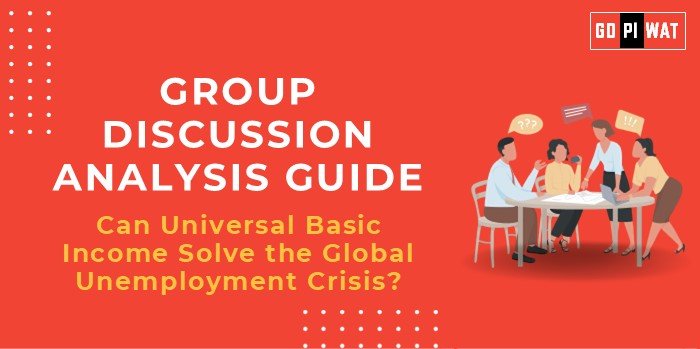📋 Group Discussion Analysis Guide: Can Universal Basic Income Solve the Global Unemployment Crisis?
🌐 Introduction
- Context: Universal Basic Income (UBI) has gained global attention as a potential solution to rising unemployment, income inequality, and economic insecurity in the face of rapid automation and globalization.
- Background: UBI is an unconditional financial scheme providing citizens with regular payments regardless of income or employment status. It aims to ensure financial security, especially as technological advancements threaten to displace millions of jobs globally.
📊 Quick Facts and Key Statistics
• 🌍 Global Unemployment Rate: 5.1% in 2023, a slight improvement from 5.3% in 2022 (ILO).
• 🤖 Automation Impact: 20-30% of jobs globally could be automated by 2030 (McKinsey).
• 📋 Pilot Studies: Finland’s 2017–2018 experiment provided €560 monthly to 2,000 unemployed individuals. While employment effects were negligible, participants reported reduced stress and improved life satisfaction.
• 🌐 Global Poverty: 8.4% of people live below $2.15/day (World Bank, 2023).
• 🤖 Automation Impact: 20-30% of jobs globally could be automated by 2030 (McKinsey).
• 📋 Pilot Studies: Finland’s 2017–2018 experiment provided €560 monthly to 2,000 unemployed individuals. While employment effects were negligible, participants reported reduced stress and improved life satisfaction.
• 🌐 Global Poverty: 8.4% of people live below $2.15/day (World Bank, 2023).
👥 Stakeholders and Their Roles
- Governments: Draft policies, allocate budgets, and oversee implementation.
- International Organizations: Provide funding and frameworks for testing UBI models globally (e.g., World Bank, UNDP).
- Private Sector: Assist in funding through progressive taxation; employers benefit from a stable consumer base.
- Citizens: As beneficiaries, their feedback and behavior shape the effectiveness of UBI.
🏆 Achievements and Challenges
- Achievements:
- ✨ Improved Well-Being: Finland’s UBI recipients experienced better health, reduced stress, and enhanced life satisfaction.
- 💰 Reduced Poverty: Kenya’s UBI experiment showcased a 20% reduction in extreme poverty.
- 📋 Administrative Efficiency: UBI simplifies welfare systems, cutting bureaucratic inefficiencies.
- Challenges:
- 💸 Fiscal Sustainability: High costs make large-scale implementation difficult.
- 📉 Employment Effects: Finland’s study found no significant employment gains among recipients.
- 🌍 Global Examples:
- ✅ Success: Alaska’s Permanent Fund Dividend provides supplemental income, demonstrating long-term feasibility.
- ⚠️ Challenges: Finland’s results highlighted limited impact on employment, despite improved well-being.
📋 Structured Arguments for Discussion
- Supporting Stance: “UBI ensures a safety net against automation-driven job losses and promotes mental well-being.”
- Opposing Stance: “High fiscal costs and negligible employment impact make UBI impractical for most economies.”
- Balanced Perspective: “While UBI improves individual well-being, its scalability and employment effects require careful assessment.”
🗣️ Effective Discussion Approaches
- Opening Approaches:
- 💬 Statistical: “With 20-30% of jobs at risk due to automation by 2030, UBI offers a lifeline for millions displaced by technological advancements.”
- 💬 Case-Based: “Finland’s UBI experiment improved well-being but showed limited impact on employment, raising questions about its overall efficacy.”
- Counter-Argument Handling:
- 📖 Acknowledge fiscal challenges and propose hybrid models integrating UBI with targeted welfare programs.
- 💡 Emphasize the importance of non-financial benefits, such as improved health and reduced stress.
🔍 Strategic Analysis (SWOT)
- 🏅 Strengths: Direct poverty alleviation, improved mental health, and reduced bureaucratic complexities.
- ⚠️ Weaknesses: High implementation costs, minimal employment impact.
- 🌱 Opportunities: Mitigating automation-driven unemployment, promoting economic stability.
- ⚡ Threats: Inflation risks, resistance from stakeholders.
🎓 Connecting with B-School Applications
- Real-World Applications: Projects focusing on fiscal policy innovations, social safety nets, or labor market disruptions.
- Sample Interview Questions:
- 💡 “How can UBI be balanced with targeted welfare programs for maximum impact?”
- 💡 “What lessons can be drawn from global UBI experiments for large-scale implementation?”
- Insights for Students: Research hybrid UBI models and explore its integration with training programs for automation-affected sectors.


